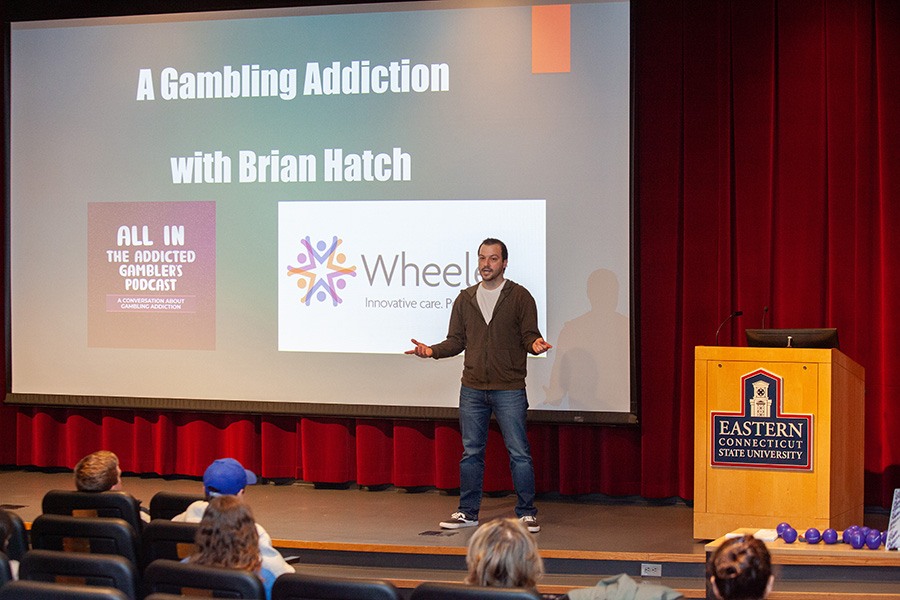- Apply
- Visit
- Request Info
- Give
'Hidden Addiction': When does gambling become a problem?
Written by Jack Jones
Published on March 02, 2023

Recovering gambling addict Brian Hatch lectured at Eastern Connecticut State University on Feb. 22, chronicling his lifelong struggles with gambling addiction and providing numerous tips on how college students can curtail their gambling habits. The Office of Wellness Education and Promotion, in collaboration with the Connecticut Council on Problem Gambling, invited Hatch to speak at the University Hour event.
“I was kicked out of school, fired from my job and I had to file bankruptcy, all because of gambling,” Hatch said. “I have some personal accountability, but I was addicted. I couldn’t stop.”
Hatch gained national recognition in the recovery community for his podcast, “All In: The Addicted Gambler’s Podcast.” Throughout the show's 330-episode run, Hatch shares the “lived experience stories” of former gamblers, therapists and other individuals involved in the recovery process.
His impact on the local community has helped Connecticut residents overcome their gambling addictions. Hatch works as a sobriety peer specialist for the state’s Better Choice Gambling Treatment Program, which provides gambling addicts with one-on-one therapy sessions with clinicians, therapists and peer specialists.
“Gambling addiction is called the hidden addiction, because usually nobody else can see it,” Hatch said. He added that unlike substance abuse issues and addictions, “you do not know that these individuals are suffering, because there are no recognizable signs.”
With recent changes in legalization and the accessibility of gambling, gambling disorders among college-age young adults are surging to unprecedented levels. Throughout the past decade, the number of college students suffering from gambling disorders has increased by 50%, according to Hatch. Reports indicate that more than 75% of American college students have gambled or engaged in gambling related activities within the past year.
“The accessibility of gambling has dramatically increased in Connecticut,” said Shannon Perry, graduate intern in the Office of Accessibility Services and the Office of Wellness Education and Promotion. “In October 2021, the state of Connecticut expanded gambling opportunities to include online sports betting and online casino gambling. Since the expansion, the state has collected over $35 million.”
Such issues prompted the Connecticut Council on Problem Gambling to award to Eastern the College Campus Prevention Initiative Grant. The grant seeks to inform students about the risks associated with gambling, support safer gambling at the college level and increase awareness for resources that are available for students.
“At a certain point with gambling, your brain believes this behavioral addiction is like a substance,” Hatch said. “You are addicted to it like it is a substance.”
Despite the normalization of online gambling among college-age adults, Hatch said that only 10% of individuals who develop problematic gambling habits seek professional mental health consultation.
Because of this, Hatch provided students with a variety of warnings that help indicate signs of gambling addiction. These include: absence from class, dropping grades, progressive preoccupation with gambling, withdrawal from friends and family, changes in behavior, decline in health, and lies about engaging in gambling behavior.
“That’s the thing about gambling, it makes you a raging liar,” Hatch said. “I lied to get money, I even lied about things unrelated to gambling, because I became so used to lying.”
Finally, Hatch noted that habitual gambling produces the highest rate of suicidality among every group of addicts — including drug/substance abusers.
“The rates are so high, and you never know why someone is suffering,” Hatch said. “Suicidality may be the worst aspect of this addiction, but that’s why I do this work. I want people to know that there is help out there.”


